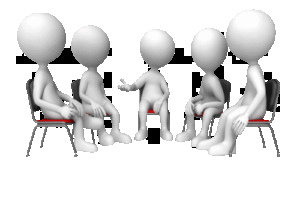
Why Support Groups ?
Support groups are healthy because it is not just one person listening to how you think or feel.

A support group is typically a group of individuals who need similar resources and peer counsel.

Support groups are not just about getting but are also about giving to help others which is truly a beautiful thing to witness.

There is nothing quite like individuals using their pain to help themselves as well as others to heal.

When you are choosing a support group, there are factors that need to be considered as you make your decision. Support groups are a source of emotional support.

They help people in knowing that they are not the only ones having these issues. Such groups are a way for people to share their coping strategies.
Support groups have proven to work very well for many people and if you feel like you need one, you should begin searching for one in your area. If you are not able to find a support group to join by searching online, check with your Doctor or with your local hospitals
Community members, organizations, mental health service providers, schools, campuses, hospitals, and clinics are usually the ones who form these support groups.
Factors to consider:

-
What type of support group is this?
Be sure that you are joining a support group that is designed to help individuals with your specific needs

Location
You need to think about the location of the meetings. Having to travel far away just to go to a support group meeting may not be good for you. Be sure to account for your drive time and how that may affect your participation during the meetings.
If you like your support group and do not want to quit but the drive is a bit long try different activities that you can do during the drive to calm your nerves. Such activities may include singing along to positive uplifting music or listening to a book etc.
-
Who are the people visiting these meetings?
Going somewhere to seek help and not feeling comfortable won’t be helpful at all so if you are left feeling as though you do not fit in or that you will not get along with other group members begin searching for a more compatible group.

No other options? You can always try to organize your own support group meetings. Or, try many other therapeutic forms such as journaling or exercising as they are a good way to turn the things that are bothering you into something physical that you can come back to later and read or let out stress/frustrations.
-
How long does the meeting last?
Be sure to factor in your own anxiety and how long you are able to sit in a group setting. If you feel the group is too long then begin searching for a different group or speak with your group Facilitator to explain your situation so that they understand if you often leave early.
-
Participate

As with most things in life, you get back what you put in. Participation is important within support group settings because the more you allow yourself to open up in order to help your pee
rs understand where you are at the more positive your outcome will be.
-
Retain

At times information feels more like overload than resource, but these resources are passed out to equip support group members with the tools they need to help themselves during times of need outside of group meetings so be sure to keep a folder or special area containing support group materials.
-
Recover & Heal

Remember that recovery and healing are possible. Also remember that bad or low days may re-appear so use the tools you have obtained to help you pull yourself out of the “funk” that tends to sneak up on you at any given time. Remember that recovery and healing begin and ends with your efforts and you are worth every effort put in throughout your healing journey!
